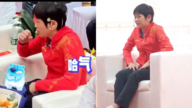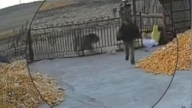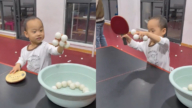【新唐人2011年11月10日讯】北京市举行区县、乡镇人大代表换届选举结束,等计票结束后,将进入代表资格审查环节,预计在11月中旬,各选区将公布选举结果。23名独立参选人则全部被封杀。宪政学者陈永苗表示,民间政治改革呼声越大,中共维稳机制就越强大,他认为这种改革已经行不通了。
今年是历届人大选举中最多民间人士自荐参选的一届,一些独立参选人在网上的宣传受到当局封杀、禁止投票或跟踪等方式打压,就算获得足够提名人数也不被采纳。
观察大陆独立参选现况的宪政学者陈永苗指出,从今年众多的独立候选人出来竞选可以看出一个社会现象,就是民间对政治改革的渴望已经非常强烈。
陈永苗:“再来看独立候选人,像北京的、广东的,几乎都全军覆没了,也就是,促进真正的政改跟民主化,我觉得这个路线是不可行的。但是我觉得做这种事情还是非常有意义的,它能够具体带动人民抗争的意识。”
北京公民戈女士原本有意参选这次人大代表,7号,她向单位领导索要选票,遭到阻碍。
戈女士:“我就去要选民证,他们就一直阻扰我不让我参选,我就给领导打保票,我说行,我不去参选,他说都已经定好了你就是参选你能怎么着﹖我说我知道,是,就是百分之九十选我,我也不可能当上代表。”
戈女士被威胁恐吓。在惊吓中,她打电话向独立参选人刘萍求救。
刘萍:“她昨天不断的向我求救,她说她有危险,警察可能对她采取行动,对家人不利。我说公民有权利选择放弃﹙参选﹚或者选择谁,这个选票是你的权利,没有哪个法律规定,这个选票必须要投给哪个或必须要计较,因为本身它都有那一项,就是弃权票。”
陈永苗形容现在民间就像火山上的溶岩正在寻找一个突破点。相对的,来自民间政治改革的声音越大的话,共产党的管制也就越大,维稳机制也就越强大。
陈永苗:“现在这个维稳机制,它就有点像杀手软件,就像计算机程序杀毒一样,它认为,像独立候选人这样子的东西是个病毒, 它不管你的动机是为了促进它改良还是为了干什么,它是不管你这些的。”
中国大陆选举单位有个“选民小组代表”,负责筛选参选人资格,筛选过程却从不对选民或参选人公布,外界只能看到最后的正式候选人名单,连被淘汰的原因也不透露。
根据《新浪》微博一项民调显示,绝大部分人表示,投票前没有见过候选人或知道他们的竞选主张。有44%人透露,投票前有人要他投票给谁。有4%网民则表示曾投反对票。而在不理想的选举制度下,22%网民表示,“领到过选民证,但放弃了投票”。
陈永苗表示,他已经对这种独立候选人的政治改革没有太大的期待了,要推动中国的改革发展,必须从新寻找一条改革之路。
新唐人记者朱智善、李庭、黎安安采访报导。
Political Reform Vs. “Stability"
The district and county level elections for
National People’s Congress (NPC) have concluded.
After the votes are counted, the election will move into
background check phase.
Election results will be announced in mid November. All 23
independent candidates were blocked from participating.
Political Scholar Chen Yunmiao believes that the louder
citizens’ call for political reform, the harder CCP (Chinese Communist Party) enforces stability.
Is this type of reform likely to happen?
This year’s election had the most independent candidates
compared to past elections.
However, independent candidates’ online campaign ads
were deleted by the regime.
Some were restricted from getting votes, and others
were disqualified even after submitting enough votes.
Political Scholar Chen Yongmiao studies independent
candidates in mainland China.
He said that a trend can be seen from this year’s election,
which is that the general public wants a political reform.
。”
Chen Yongmiao: “The independent candidates, like those
in Beijing and Guangdong, were pretty much all wiped out.
Which means, this is not the way to go
to push for democracy, I think.
However, I see this as very meaningful,
because it motivates people to fight back."
Beijing resident Mrs. Ge wanted to participate in the NPC
election, but officials at her workplace rejected her request.
Mrs. Ge: “When I asked for candidate card,
they stopped me from participating. I said then I won’t participate.
They said, ‘everything is decided, why participate?’
I said even if 90% vote for me, I won’t get elected."
Mrs. Ge was also threatened. After the threats, she called
independent candidate Liu Ping, asking for help.
Liu Ping: “She called me a lot yesterday asking for help.
She said she might be in danger, police might do something to her and affect her family.
I told her citizens have the right to vote,
you have the right to vote for whoever you want.
There is no legal regulation, you don’t have to vote
for this or that person."
Chen expressed that the general public is seeking
a crack in the system,
but as the voice for political reform grows,
the regime’s control over mechanisms also grows.
Chen Yongmiao: “This control mechanism,
it’s like an anti-virus software.
It thinks independent candidates are a virus,
it doesn’t care what your motive is, it doesn’t care."
In China, each workplace has an “election committee"
in charge of checking the qualifications of the candidates.
They only announce the final candidates list and don’t give
any reasons why these candidates are in the list.
According to a survey on Sina micro-blog, most people have
not seen the candidates and don’t know what their views are.
44% were told who to vote for; 4% said they voted against
orders; 22% said they got the voting card, but didn’t vote.
Chen expressed that he doesn’t see much hope
in this method of independent candidates.
To push for political reform in China,
a new way must be found.
NTD reporters Zhu Zhishan, Li Ting and Li Anan




























